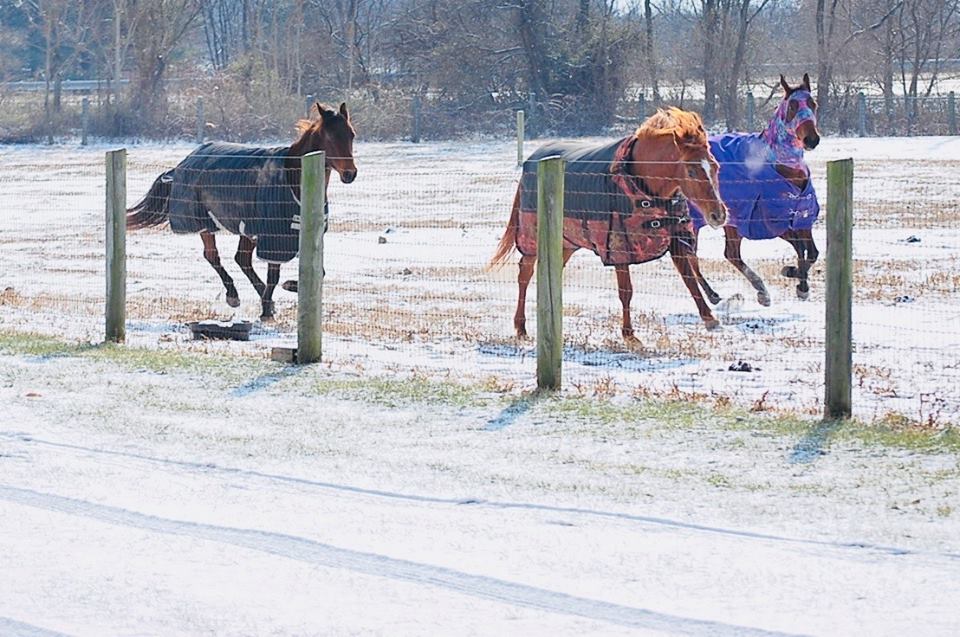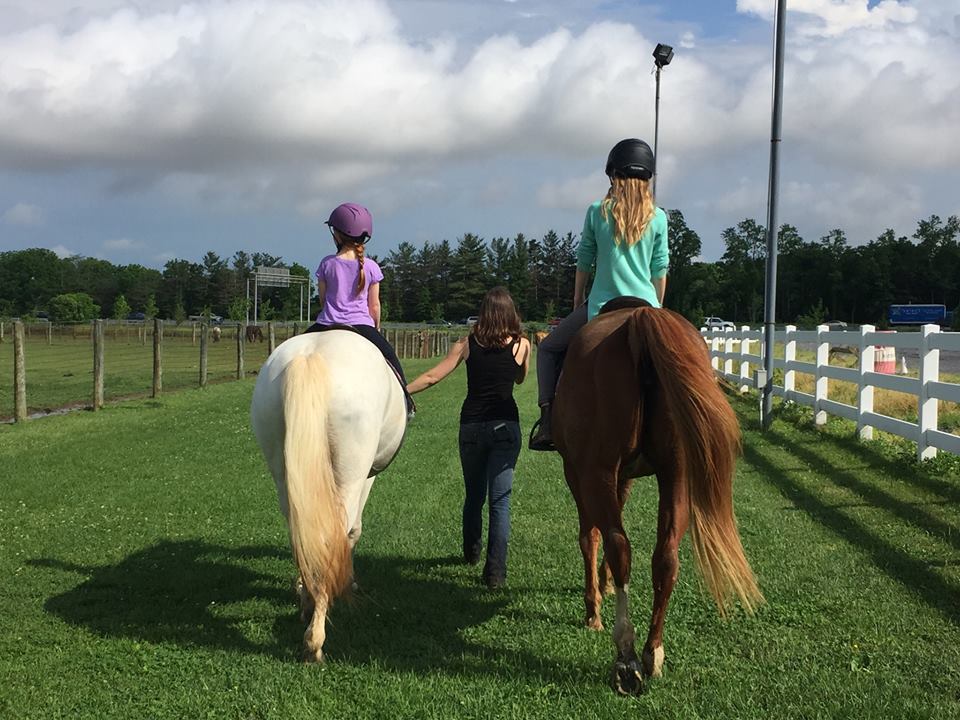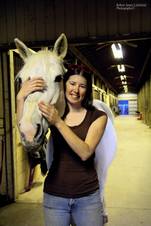Horses love to run and play in cold weather to keep warm!
Horses have been domesticated for over 6,000 yrs and bred for a large variety of purposes. Originally used for food and transportation, the horse is now used for many sports, games and competitions as well as still finding their place as a work animal in some cultures. A mare's gestation period is around 11 months, after which a foal should stay with their mother for 5-6 months. Most male horses (colts) are gelded around 18 months of age, while females called fillies are generally left intact. The age at which a colt is gelded is often based on their temperament, as leaving a quiet and non-studish colt intact until they begin work under saddle can improve strength and muscle tone. In the wild horses exhibit short bursts of activity followed by long periods of quiet grazing, socializing and gentle playfulness. Socializing is an important part of the herd dynamic, and can be fascinating to watch! Although often thought of as high spirited and with lots of presence, the horse is a prey animal who often communicates silently though body language. It is important to understand your horses language to keep yourself safe together, as well as to establish a healthy bond with your horse! Whether as a companion or a sporting partner, a minimum of two acres of turnout area per horse is necessary. Any turnout area needs to have a shelter that the horses can access at will with three walls and a roof. A 12ft x 18 ft run in shed is adequate for 2-3 average sized horses if they get along quite well.
Horses need a mainly forage diet. Forage includes grass, hay, and beet pulp which may be added to high quality feed as a supplemental form of forage. Horses can be fed as much forage as they will eat, with care being given to limit the sugar intake from hays such as alfalfa. Supplemental cereal grains may be added up to 1/2 lb of grain per 100 lbs of horse. As a social and herd animal, horses should be kept on the same property as other equines. Kept alone, a horse will develop depression and/or anxiety greatly dampening their quality of life and even their life span. They get along well with not just other horses but also ponies, donkeys and mules. Some highly anxious horses and those who can't be kept with other horses for special reasons (such as a stallion) even enjoy having a goat as a companion who can join them in the field, stall and away from home at competitions! Animal Care Costs per Month
While keeping a companion horse at your own farm with ample grass will save a lot on board and extra hay, a horse in training or at a boarding facility will require a lot more to keep healthy and happy! A young or green (inexperienced) horse, or any horse who is being used for competition will need professional training either continually or as a tune up from time to time. Since riding is a sport in which your equine team mate can't verbally talk to you, it is recommended to always take lessons in riding and horsemanship no matter what your experience level. Even Olympic Dressage riders still take lessons from one another! Horses require a high level of skill and knowledge to care for and shouldn't be taken on lightly. They can be very costly and have a longer life span than many other pets. Intelligent and social, horses form a strong bond with their herd mates including their human and thrive on routine and consistency. Many if not most behavioral problems leading to dangerous behavior can develop from the misunderstanding of equine language and the separation caused by buying, selling, and moving horses from farm to farm. A happy horse has the same owner for most or all of their life, with a stable long term herd at home. With appropriate time, research and work put in a horse can be a sport and adventure partner and companion like no other!
3 Comments
7/5/2023 12:04:53 am
I thoroughly enjoyed reading your care sheet on equine animals. As an avid horse lover, I appreciate the effort you put into providing detailed and comprehensive information. Your post covers everything from feeding and grooming to exercise and healthcare, making it an invaluable resource for both new and experienced horse owners. I particularly liked your emphasis on creating a safe and comfortable environment for horses. It's also great to see your mention of the importance of mental well-being, and I couldn't agree more. In addition to the practices you highlighted, I would also recommend considering the use of the <a href="https://centerlinedistribution.net">best calming supplement for horses</a> to support their overall relaxation and stress management. Thank you for sharing such a helpful and informative piece!
Reply
12/15/2023 10:42:04 pm
Wow! Your site is amazing. Please visit our website. Thanks
Reply
Leave a Reply. |
About the blogFerrets and Friends, LLC has four writers bringing you information on a variety of topics from pets to wildlife, education to conservation, and from new developments in our business to information about our industry. Learn something new each week! Archives
August 2020
Categories
All
|



 RSS Feed
RSS Feed